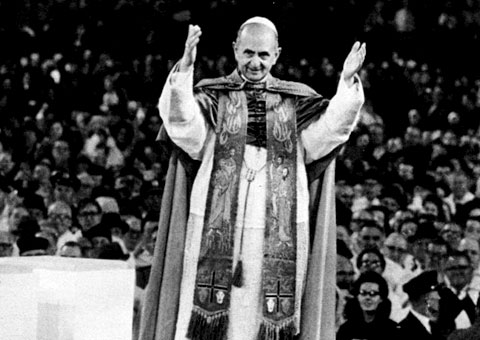
7 April 1975
Newman, who was convinced of being faithful throughout his life, with all his heart devoted to the light of truth, today becomes an ever brighter beacon for all who are seeking an informed orientation and sure guidance amid the uncertainties of the modern world – a world which he himself prophetically foresaw.
17 May 1970
Newman’s thinking was deeply grounded in the faith and, at the same time, was in close harmony with the best of the demands of intelligence and modern feelings. Like St. Augustine, Newman knew what it cost in suffering to discover the full truth. He recalls to our mind that the search for the truth is an irresistible need of the human spirit and that “to be in earnest in seeking the truth is an indispensable requisite for finding it” (Oxford University Sermons, London, 1843). Confident in the intelligence of man and in the action of grace which penetrates it from within, Newman invites us to deepen our understanding of the faith with serenity, and to foster the development of conscience strengthened by the Holy Spirit, in fidelity to the Gospel, after the example of the Virgin Mary (Oxford University Sermons).
Newman’s profound attachment to the Church is on a par with a demanding respect for the incomparable dignity of the human person, for the unique and irreplaceable character of the person’s vocation and his immediate responsibilities before God. He glorifies conscience: which he does not hesitate to define as “the aboriginal Vicar of Christ, a prophet in its informations, a monarch in its peremptoriness, a priest in its blessings and anathemas” (A Letter to the Duke of Norfolk, London, 1875). But Newman immediately explains what he means by “conscience, as I have described it. … [and not] that miserable counterfeit which, as I have said above, now goes by the name. [The Christian] must vanquish that mean, ungenerous, selfish, vulgar spirit of his nature, which, at the very first rumour of a command, places itself in opposition to the Superior who gives it, asks itself whether he is not exceeding his right, and rejoices, in a moral and practical matter to commence with scepticism.” (A Letter to the Duke of Norfolk). This remark is of amazing timeliness, like so many insights which have by no means exhausted their fruitfulness for the Church.
27 October 1963
Newman, in full consciousness of his mission – “I have a work to do” – and guided solely by love of the truth and fidelity to Christ, traced an itinerary, the most toilsome, but also the greatest, the most meaningful, the most conclusive, that human thought ever travelled during the last century, indeed one might say during the modern era, to arrive at the fullness of wisdom and of peace.